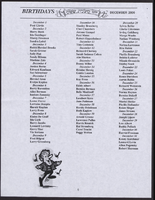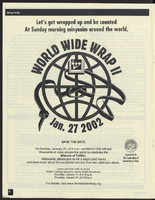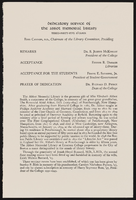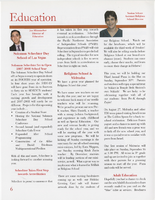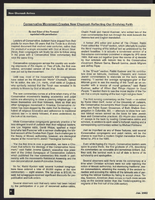Search the Special Collections and Archives Portal
Search Results

Arsya Respati oral history interview: transcript
Date
Archival Collection
Description
Oral history interview with Arsya Respati conducted by Madison Chang on December 4, 2021 for Reflections: The Las Vegas Asian American and Pacific Islander Oral History Project. University of Nevada, Las Vegas (UNLV) student Arsya Respati shares his childhood and upbringing in Jakarta, Indonesia and educational background. He discusses his studies at the international BINUS SCHOOL Simprug in Jakarta and his immigration to the United States with his younger brother to pursue the culinary arts at the William F. Harrah College of Hospitality at UNLV. Arsya Respati talks about his relationship with his parents and their daily communication, his "aunty" who has helped him adjust to American culture and homesickness, his Muslim faith and traditions, and his employment. He also shares his views on Indonesian politics and cultural diversity, and the diversity of Las Vegas.
Text
Beula Jane Adams oral history interview
Identifier
Abstract
Oral history interview with educator Beula Jane Adams (b. 1902) conducted by Maureen Conner on May 11, 1977 for the Ralph Roske Oral History Project on Early Las Vegas. Born in Smithfield, Nebraska, Adams relocated to Las Vegas, Nevada in 1932. During the interview Adams explores and highlights the role of education in relation to the social development of Nevada. Adams discusses presidential visits, early above ground atomic tests, and her involvement in local politics.
Archival Collection
Marihka "Minddie" Lloyd oral history interview
Identifier
Abstract
Oral history interview with Marihka "Minddie" Lloyd conducted by Kristel Peralta and Stefani Evans on June 15, 2021 for Reflections: The Las Vegas Asian American and Pacific Islander Oral History Project. Minddie talks about her upbringing in Manila, Philippines by her paternal grandmother and sisters (her Lolas) and her immigration to the United States at a young age. her personal history and childhood, including abuse that she suffered and her time in foster homes and a girls' home, Olive Crest. Minddie discusses the mentors she met through Olive Crest and her move to Las Vegas as an adult where she met her husband, an undercover Las Vegas Metro officer. Minddie talks about her employment with Hawaiian Air Lines, her support of the Injured Police Officers' Fund, and the creation of "Bamboo Bridges," a nonprofit organization based in Henderson, Nevada that aids abused, trafficked Asian women. Minddie also shares how she and her husband both contracted COVID-19 in 2020, and the untimely death of her spouse the day Minddie was released from the hospital. She shares how this event caused her to convert from Catholicism to the Church of Jesus Christ of Latter-Day Saints, the religion of her late husband.
Archival Collection

Michael Arage oral history interview: transcript
Date
Archival Collection
Description
Oral history interview with Michael Arage conducted by Dalton DuPré on November 12, 2021 for Reflections: The Las Vegas Asian American and Pacific Islander Oral History Project. In this interview, Michael Arage discusses his upbringing in the Greater Toronto Area (GTA), Ontario, Canada with his sister and his Filipino-Palestinian heritage. He talks about how his parents immigrated to the United States, his life and education in Toronto, and his relocation to Los Angeles, California where he married his wife. Michael Arage shares how the couple moved to Las Vegas, Nevada in 2012 when his wife started a job at Zappos. Because he lacked a work visa, Michael Arage began playing poker and working in sports betting. In 2019, he founded a community organization to support the people of Palestine, called Nevadans for Palestinian Human Rights. Michael Arage talks about his activism efforts, anti-Arab racism, his cultural upbringing, and of Filipino and Arabic foods and customs. He also shares his views of living in Las Vegas, the difficulties of raising a child away from her cousins, and differing governmental policies and healthcare between Canada and the United States.
Text
Margot Mink Colbert oral history interview
Identifier
Abstract
Oral history interview with Margot Mink Colbert conducted by Barbara Tabach on November 11, 2014 for the Southern Nevada Jewish Heritage Project. Colbert discusses her Jewish heritage and her background in ballet dancing. She also talks about “Transitions Trilogy,” her original story of Jewish immigration into New York and Jewish contributions to mainstream media, all expressed through dance.
Archival Collection

